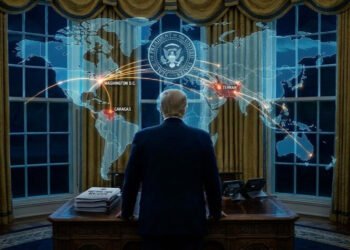“Editor-in-Chief: SHAPOUR-T”
In a dramatic escalation of regional tensions, the United States has reportedly begun evacuating personnel from its embassy in Baghdad, issued warnings to American citizens in Bahrain, and is making unusual movements across military bases in Iraq, Qatar, and Kuwait. These developments come just as President Donald Trump signaled a significant loss of confidence in reaching a nuclear agreement with Islamic Republic — a deal his administration had previously suggested was “within reach.”
“I used to think it was possible to get Iran to shut down its nuclear program,” Trump said in an interview published Wednesday, June 11. “Now, I’m not so sure. They seem to be playing a delay game.”
Nuclear Diplomacy Hits a Wall
This marks the first time Trump has publicly expressed deep pessimism about a possible nuclear accord with Iran. Until recently, the administration maintained that negotiations — now entering their sixth round — were progressing, despite delays.
The stalemate centers around uranium enrichment: while Washington demands zero enrichment, Iranian officials have declared that any such condition is a “red line.”
Compounding the diplomatic impasse, Islamic Republic has stockpiled over 408.6 kilograms of uranium enriched up to 60% purity — a 50% increase in just three months — bringing it dangerously close to weapons-grade levels. According to nuclear analysts, this amount significantly reduces the time needed for Iran to weaponize its program.
Signs of Imminent Risk
Multiple intelligence sources have pointed to increased activity at Iran’s Fordow and Natanz nuclear facilities. Simultaneously, Israeli officials have warned that Iran is approaching a red line, prompting speculation about a possible preemptive military strike by Tel Aviv.
Further raising alarms, Iran’s defense minister Amir Nasirzadeh issued an open warning on Wednesday:
“All U.S. bases in the region are within reach, and if conflict is imposed, we will strike them without hesitation.”
His remarks are widely interpreted as threats toward U.S. military installations in Qatar, Bahrain, and the UAE, which collectively host over 30,000 American troops.
Russia Offers a Lifeline
In a potential diplomatic breakthrough, Russia has proposed receiving Iran’s enriched uranium and converting it into reactor fuel — an idea that could ease tensions if accepted by all parties.
Russian Deputy Foreign Minister Sergey Ryabkov stated:
“We are ready to assist, both politically and practically — for example, by processing Iran’s surplus uranium into civilian reactor fuel.”
Whether such fuel would be returned to Iran or held abroad remains unclear.
A Shift in Posture
Amid this climate of heightened risk, the U.S. has begun what some analysts call a “strategic repositioning”: reducing diplomatic footprint, bolstering regional assets, and preparing for potential conflict scenarios.
While Trump continues to insist that Iran will not be allowed to develop a nuclear weapon — with or without an agreement — his latest comments signal a shift from diplomacy to deterrence.
As one senior intelligence official put it:
“It feels like the calm before a very sudden storm.”
With both sides digging in and military assets on the move, the next few weeks may define the future of the region — and possibly the world’s nuclear stability.

 English
English



























































